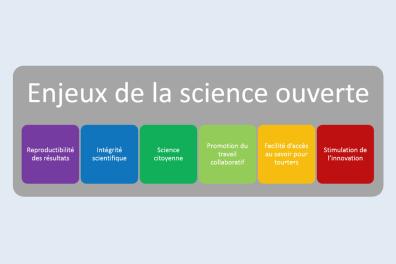Open Science seminar: issues and methods
CNRS Villejuif Campus
Conference room
Ground floor - Building D

The field of Open Science has developed over the last thirty years as a transdisciplinary movement, carrying methods and devices linked to the free dissemination of science in all its dimensions (publications, data, and tools). Far from being a simple consequence of technological development, Open Science calls on cross-disciplinary issues and skills that require strong scientific cooperation. The growing interest in Open Science, as evidenced by the implementation of the National Open Science Plan (https://openarchiv.hypotheses.org/4767), encourages us to explore this theme with doctoral students, right from the start of their thesis, in terms of the production, management and dissemination of scientific data. It is with this in mind that, for the second year running, the "Open Science: issues and methods" seminar aims to introduce PhD students in the Humanities and Social Sciences to the theoretical and methodological aspects of Open Science. The seminar aims to offer a panoramic vision of the multiple issues (technical, epistemological, legal, ethical) that characterize Open Science, and to enable participants to reflect on their practices.
The seminar has been running since the 2020-2021 year. Video recordings of this first year are online on Canal-U (see: https://himalco.hypotheses.org/files/2021/02/Affiche-Sciences-Ouvertes-4-3.pdf). In 2021-2022, the seminar will focus on the implementation of Open Science strategies in developing countries. Open Science involves major challenges in terms of the transmission of knowledge/skills and the use of digital technology in diverse national and areal contexts.
Sessions will be divided between thematic presentations aimed at introducing the theoretical fundamentals of Open Science and workshops during which PhD students will be confronted with the practical aspects of disseminating scientific production in the Human and Social Sciences. The seminar, which retains its site-based logic (anchored on the CNRS Villejuif campus), aims to articulate flexibly with other available training offers (Sorbonne Nouvelle, INALCO and BULAC, CNRS...), including content available online.
Responsible: Natalia Cáceres Arandia (SeDyL - CNRS, INALCO, IRD), Stefano Manfredi (SeDyL - CNRS, INALCO, IRD), Alexis Michaud (LACITO - CNRS/Sorbonne Nouvelle/INALCO)
Sessions 2021-2022
Tuesdays, 10am-12pm:
Oct. 12. 2021 Data and tools: open formats and free licenses with a view to sustainability. Stéphane Crozat (Université Technologique de Compiègne, Framasoft, Picasoft) and Mathieu Wostyn (association Globenet).
Nov. 16, 2021Data: planning collection in anticipation of preservation and dissemination. Alexis Michaud (CNRS-LACITO).
Nov. 23, 2021 (Re-)thinking digital practices: adopting free software and services for open science. Mathieu Wostyn (Globenet association) and Balthazar Do Nascimento (CNRS-LACITO).
Nov. 30, 2021 Penser les sciences ouvertes dans les Suds 2/2: mise en oeuvre de stratégies de recherche ouverte dans les pays du Sud. Jean-Christophe Desconnets, Director of the Mission Science Ouverte (IRD).
Jan. 4, 2022 Where to publish? Panorama of editorial practices and reflection on the issues. Raphaëlle Chossenot (CNRS-LACITO) and Julie Giovacchini (CNRS-Centre Jean Pépin).
Jan. 11, 2022Penser les sciences ouvertes dans les Suds 1/2: la transition numérique des SHS françaises sur le Moyen-Orient. Mercedes Volait (CNRS-InVisu).
For further information, please contact: natalia.caceres.arandia@cnrs.fr and stefano.manfredi@cnrs.fr